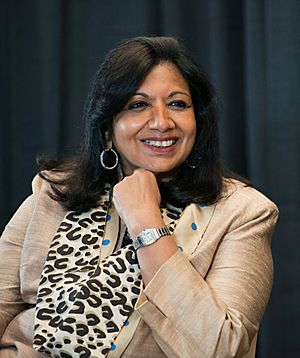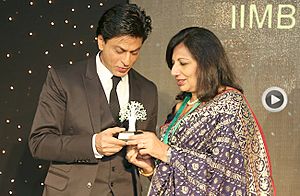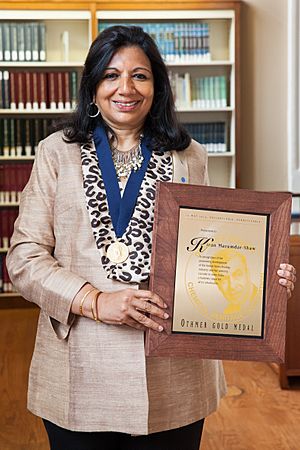Kiran Mazumdar-Shaw facts for kids
Quick facts for kids
Kiran Mazumdar-Shaw
|
|
|---|---|

Mazumdar-Shaw in 2014
|
|
| Born |
Kiran Mazumdar
23 March 1953 Bangalore, Mysore State, India
|
| Alma mater | Bangalore University (B.Sc.) Melbourne University (M.S.) |
| Occupation | Founder & chairperson of Biocon |
| Spouse(s) |
John Shaw
(m. 1998; died 2022) |
| Awards | Padma Shri (1989) Padma Bhushan (2005) Othmer Gold Medal (2014) |
Kiran Mazumdar-Shaw (born 23 March 1953) is a famous Indian businesswoman and a billionaire. She is the founder and leader of Biocon Limited and Biocon Biologics Limited, which are biotechnology companies in Bangalore, India. She was also the chairperson of the Indian Institute of Management, Bangalore. In 2014, she received the Othmer Gold Medal for her amazing work in science and chemistry. Forbes magazine listed her as one of the most powerful women in the world in 2019. She was also named EY World Entrepreneur Of The Year in 2020.
As of 2024, Mazumdar-Shaw was among the wealthiest people in India.
Contents
Early Life and Education
Kiran Mazumdar was born on March 23, 1953, in Bangalore, India. She went to Bishop Cotton Girl's High School and finished in 1968. After that, she studied biology and zoology at Mount Carmel College, which is part of Bangalore University. She earned her bachelor's degree in zoology in 1973. Kiran wanted to go to medical school, but she couldn't get a scholarship.
Her father, Rasendra Mazumdar, was a head brewmaster at United Breweries. He suggested she study fermentation science and become a brewmaster, which was a very unusual job for a woman at that time. Kiran went to Ballarat College, Melbourne University in Australia, to learn about making beer. In 1974, she was the only woman in the brewing course and was the top student. She became a master brewer in 1975.
First Jobs and Challenges
After her studies, she worked as a trainee brewer in Australia. She also worked as a technical consultant in India. However, when she tried to find a job as a master brewer in India, she was told it was "a man's work." Because of this, she started looking for opportunities outside India and was offered a job in Scotland.
Starting Biocon
Before Kiran could move to Scotland, she met Leslie Auchincloss. He was the founder of Biocon Biochemicals Limited, a company in Ireland that made enzymes for brewing, food, and textile industries. Auchincloss was looking for someone in India to help start an Indian branch of his company to supply him with an enzyme called Papain. Kiran agreed to take the job.
The Beginning with Enzymes
After a short training period in Ireland, Kiran Mazumdar-Shaw returned to India. She started Biocon India in 1978 in the garage of her rented house in Bengaluru. She began with a small amount of money, about Rs. 10,000. Even though it was a joint venture, Indian laws meant that Kiran owned 70% of the company.
At first, she faced many challenges. People didn't trust her because she was young, a woman, and her business idea was new. She struggled to get money for her company. A lucky meeting with a banker at a social event finally helped her get her first loan. It was also hard to find people to work for her new company. Her first employee was a retired mechanic, and her first workspace was a small shed. Building a biotech business in India was tough because there wasn't good infrastructure like steady power, clean water, or advanced lab equipment.
Biocon's first projects involved taking papain (an enzyme from papaya used to make meat softer) and isinglass (from fish, used to make beer clear). Within a year, Biocon India was making enzymes and selling them to the US and Europe. This made them the first Indian company to do so. With her first year's earnings, Kiran bought a larger property to expand her business.
Growing into Medicines
Kiran led Biocon's growth from a company making industrial enzymes to a full biopharmaceutical company. This meant they started focusing on making medicines, especially for diseases like diabetes, cancer, and auto-immune diseases. She also created two other companies: Syngene (in 1994) for research support, and Clinigene (in 2000) for clinical trials and developing new medicines. Clinigene later joined Syngene.
In 1984, Kiran started a research and development team at Biocon. They worked on finding new enzymes and better ways to make them. In 1987, Biocon got a big investment of US$250,000, which helped them expand their research. They built a new factory using a special Japanese-inspired technology. In 1989, Biocon became the first Indian biotech company to get funding from the U.S. for its unique technologies.
In 1990, Mazumdar started Biocon Biopharmaceuticals Private Limited (BBLP) to make and sell special medicines in a partnership with a Cuban center.
Becoming Independent
In 1989, a large company called Unilever bought Biocon Biochemicals of Ireland. This partnership helped Biocon learn about global quality standards. Later, in 1997, Unilever sold its chemical businesses, including Biocon, to another company called ICI. In 1998, Kiran Mazumdar's fiancé, John Shaw, personally raised $2 million to buy back Biocon's shares from ICI. They got married in 1998, and she became known as Kiran Mazumdar-Shaw. John Shaw joined Biocon as its vice chairman in 2001.
In 2004, Kiran Mazumdar-Shaw decided to list Biocon on the stock market. This meant selling shares of the company to the public to raise money for research. Biocon was the first biotechnology company in India to do an IPO (Initial Public Offering). Biocon's IPO was very successful, and on its first day of trading, the company was worth over $1 billion. This made Biocon only the second Indian company to reach this value on its first day.
Making Medicines Affordable
Kiran Mazumdar-Shaw believes in "affordable innovation." This means finding ways to develop medicines that are not too expensive, especially for people in less wealthy countries. She has always looked for ways to create cost-effective methods and cheaper alternatives for drugs. She also thinks drug companies should sell medicines at fair prices in developing countries so that people can afford the treatments they need, especially for long-term illnesses.
She saw the potential for statins (drugs that lower cholesterol) early on. When the patent for a cholesterol-lowering drug called lovastatin ended in 2001, Biocon started making it. The company then expanded to other types of statins. This strategy helped statins become a major part of Biocon's income. The company's revenue grew significantly from 1998 to 2004.
Biocon continues to explore new areas. They use special yeast to produce important medical substances like vaccines, antibody fragments, and hormones.
Biocon's main research areas now include cancer, diabetes, and auto-immune diseases like rheumatoid arthritis and psoriasis. For example, because many people in India chew tobacco, there's a high rate of oral cancer. Diabetes is also common, and Biocon works on treatments for complications like "diabetes foot." They also develop drugs for psoriasis, a skin condition.
The company has developed important medicines, including human insulin for diabetes, an antibody for head and neck cancer, and a medicine for psoriasis. Biocon is Asia's largest producer of insulin.
As of 2014, Biocon invested about 10% of its income into research and development, which is a lot more than most Indian medicine companies. Biocon has applied for many patents based on its research. Mazumdar-Shaw has actively worked on buying other companies, forming partnerships, and making deals to develop new medicines.
Helping Others
In 2004, Mazumdar-Shaw started the Biocon Foundation, which is the company's social responsibility branch. This Foundation focuses on improving health, education, and infrastructure, especially in rural areas of Karnataka that don't have good healthcare.
Kiran Mazumdar-Shaw doesn't like the word "philanthropy" much. She believes it often offers quick fixes instead of solving the real problems. She prefers to be called a "compassionate capitalist." She thinks that good business models can create lasting social progress. In 2015, she joined The Giving Pledge, promising to give away at least half of her wealth to help others.
Health Initiatives
In rural India, there are very few doctors, and many people cannot afford medical care. The Biocon Foundation runs many health and education programs to help people who are not well-off.
Arogya Raksha Yojana
With Dr. Devi Shetty from Narayana Hrudayalaya Hospital, Mazumdar-Shaw supported the Arogya Raksha Yojana (Health Protection Program). Through this program, the Biocon Foundation sets up clinics that offer medical care, affordable medicines, and basic tests for those who can't pay. As of 2010, these clinics helped hundreds of thousands of people each year. They also organize health checks in villages and train young women to use smartphones to send pictures of possible cancer signs to doctors. Public health campaigns teach people about important health issues like heart disease.
These clinics use a special system where wealthier patients pay full price for convenient appointments, while poorer patients can get cheap or free services at less busy times. This helps make healthcare available to everyone.
Mazumdar-Shaw Medical Foundation
Kiran Mazumdar-Shaw's personal experiences with cancer motivated her to support cancer research and treatment. In 2009, she opened a large cancer care center, the Mazumdar-Shaw Medical Foundation, in Bangalore. She worked with Dr. Devi Shetty on this project. In 2011, she added a center for advanced treatments and research. Her goal is to create a world-class cancer treatment center.
The Mazumdar Shaw Medical Foundation is a non-profit organization that supports cancer research and outreach programs.
Education Support
Kiran Mazumdar-Shaw has supported the creation of a basic mathematics textbook, which was introduced in schools in Karnataka in 2006. She also funded a research program at the Indian School of Business in 2009 to encourage innovation.
Improving Infrastructure
Mazumdar-Shaw often talks about how important it is to improve India's infrastructure. This includes things like good governance, creating jobs, and ensuring food, water, and health security.
Companies like Biocon and Infosys have greatly changed Bengaluru. They attract many scientists who might otherwise go abroad. Bangalore, once a quiet city, is now known as a great place to work in India. Biocon Park, built in 2005, is a large campus with thousands of employees. However, outside the developed city, the infrastructure is still not very good.
Mazumdar-Shaw supports good government and infrastructure. She was part of the Bangalore Agenda Task Force, which aimed to improve the city's infrastructure. She is also involved in the Bangalore City Connect Foundation and the Bangalore Political Action Committee (B.PAC), which work to discuss and solve city problems.
After a flood in 2009, Biocon, Infosys, and Wipro all promised to help rebuild homes for flood victims in north Karnataka. Biocon committed to building 3,000 houses.
Board Memberships
Kiran Mazumdar-Shaw is a member of the board of governors for the Indian School of Business and was a member of the board of MIT, USA, until 2023. She was also a past member of the board of governors for the Indian Institute of Technology Hyderabad.
As of February 2014, Mazumdar-Shaw became the first woman to lead the board of governors of the Indian Institute of Management Bangalore (IIMB).
She is also an independent director on the board of Infosys and a member of the advisory board of the MIT Jameel Clinic.
Dr. Kiran is currently an expert on the Brand Bengaluru Task Force committee. This committee, which includes officials and other important people, discusses issues like traffic, water supply, and waste management to help develop Bengaluru. The committee has met several times to create a plan for the city's development.
Awards and Honours
In 2010, TIME magazine named Mazumdar-Shaw one of the 100 most influential people in the world. She was also on the Financial Times' list of top 50 women in business in 2011. Forbes listed her as one of the most powerful women in the world in 2014 and 2015. She was voted global Indian of the year by Pharma Leaders Magazine in 2012.
She was also recognized for her charitable giving, ranking high on the Hurun India Philanthropy List in 2019.
International Awards
Mazumdar-Shaw has received many international awards, including:
- The Othmer Gold Medal (2014) for her great contributions to science and chemistry.
- The Nikkei Asia Prize (2009) for regional growth.
- The ‘Veuve Clicquot Initiative For Economic Development For Asia' Award (2007).
- The Ernst & Young Entrepreneur of the Year Award for Life Sciences & Healthcare (2002).
- 'Technology Pioneer' recognition by the World Economic Forum (2002).
- In May 2015, Federation University Australia named a road on its campus "Mazumdar Drive" in her honor.
- She won The International Executive of the Year Award from the Academy of International Business (AIB) in 2015.
- She was named a laureate of the Asian Scientist 100 by the Asian Scientist in 2016 and 2020.
- In 2019, she was chosen as a member of the United States National Academy of Engineering (NAE) for her work in making affordable biopharmaceuticals and growing the biotechnology industry in India. She is the first Indian woman to receive this honor.
- In January 2020, Kiran received Australia's highest civilian honor.
- She was the EY World Entrepreneur of the Year in 2020.
Indian Awards
Her work in biotechnology has earned her many national awards, including the Padma Shri (1989) and the Padma Bhushan (2005) from the government of India. She received the Economic Times Award for 'Businesswoman of the Year' in 2004. She was named "Global Indian Woman of the Year" in 2012 and received the "Dynamic Entrepreneur" award in 2009. She also received the Eminent Businessperson of the Year Award in 2006.
Other Indian awards include the Indian Chamber of Commerce Lifetime Achievement Award (2005), the 'Corporate Leadership Award' (2005), and the Karnataka Rajyotsava Award (2002). In 2022, she received the "H.K. Firodia Lifetime Achievement Award" for her contributions to science and technology.
Honorary Degrees
Mazumdar-Shaw has received several honorary doctorates from universities around the world. These include her alma mater, Ballarat University (2004), the University of Abertay, UK (2007), the University of Glasgow, UK (2008), Heriot-Watt University, UK (2008), and University College Cork, Ireland (2012). She also received an honorary doctorate from Davangere University, India, in 2013, and from Concordia University, Canada, in October 2024.
Personal Life
Kiran Mazumdar-Shaw was married to John Shaw, who passed away on October 24, 2022.
 | Madam C. J. Walker |
 | Janet Emerson Bashen |
 | Annie Turnbo Malone |
 | Maggie L. Walker |



